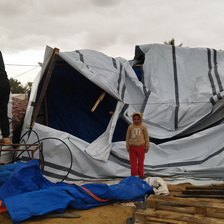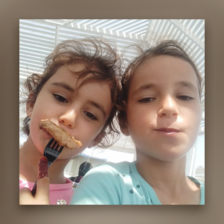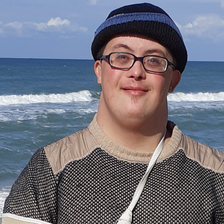The Electronic Intifada 23 December 2024
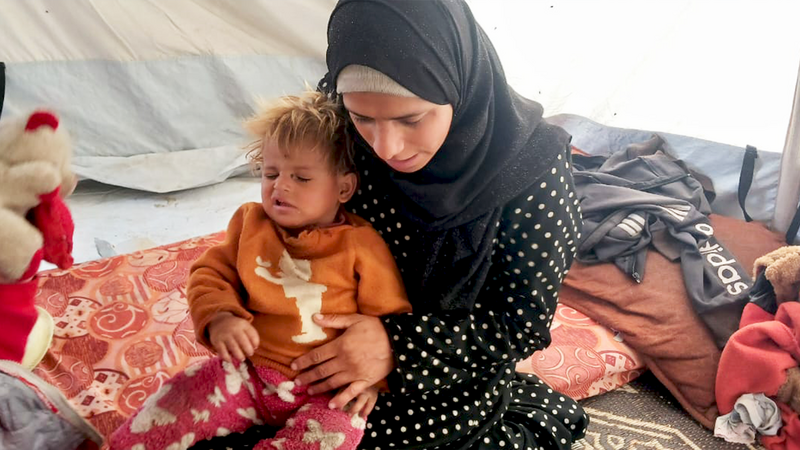
Yasmin Abu Namous and her daughter Tahani in their tent in Khan Younis in the Austrian Cemetery.
A few steps away from the now-defunct Nasser Medical Complex in Khan Younis, I work in a tent that I share with a group of journalists.
The area is not a peaceful place to work. It is overcrowded with displaced people, and the noises are never-ending, whether it’s from the hustle and bustle of everyday life or the echoes of explosions from Israeli airstrikes.
I usually walk half the distance from my home on foot, and for the rest of the way, I try to find a ride in a car – rare nowadays – or on a horse-drawn cart.
When I started working as a journalist five years ago, I knew it would be hard, especially in Gaza, but it is only harder now. Yet it is important work – a kind of humanitarian work – and at least in the tent we have community.
Recently, though, I was overwhelmed with sadness on my way to work. I walked by the Austrian Cemetery and met a woman living with her two children in a tent inside the cemetery.
I approached her, but I could tell something was off. I then understood that she couldn’t see me, that she could only hear my voice.
Yasmin Abu Namous, 33, told me that she was blind and that her daughters, Rawan, 4, and Tahani, 2, were also visually impaired.
The small family, including the husband, live in rough conditions and lack the most basic resources to live a comfortable life.
Yasmin and her family used to live in a modest house in the town of Bani Suheila in the southern Gaza Strip, before the start of the Israeli war in October 2023.
“Life has become extremely difficult,” Yasmin said, noting that she can’t afford water and food.
In December 2023 during the Israeli military’s ground invasion of Khan Younis, the Israeli army destroyed the family’s home. The family has since been back to check on their home, but it is entirely destroyed and unfit for living.
Nighttime fears
Yasmin’s visual impairment has also rendered her largely immobile. She explained that she’s afraid of unexploded ordnance and other dangers that she can’t see.
She relies on the help of her husband and her neighbor Um Khalid, who lives in a nearby tent.
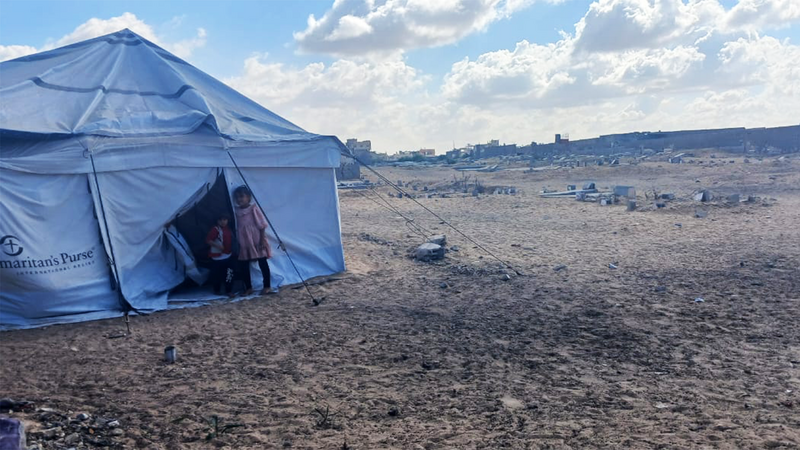
Yasmin’s daughters Tahani and Rawan in front of their tent in the cemetery.
In spite of the kindness of others, Yasmin’s daughters are also struggling in the conditions left by the Israeli army’s destruction of Gaza.
Yasmin’s main challenge is the daily struggle to secure food, water and a livelihood for her two daughters.
Rawan and Tahani have skin infections due to the lack of water. The bathroom is far from the tent, which is coming apart due to the rain.
The tent walls do not provide adequate shelter from the wind and other elements, not to mention the Israeli shelling.
The tent would be a terrifying place to be, even if one could see.
Yasmin found a few of the children’s toys in the rubble of their home in Bani Suheila, hoping that the toys would provide some distraction from the relentless sounds of explosions.
“My daughters feel extreme fear, especially at night when the bombings increase,” she said. “They wake up multiple times during the night.”
Every evening, Yasmin listens to the news broadcast, hoping to hear that there will be a ceasefire.
I returned to my work tent, overwhelmed with pain and sorrow. I feared that Yasmin’s suffering, along with that of many others, would continue amid the ongoing war in Gaza.
Shaimaa Eid is a journalist based in Gaza.


